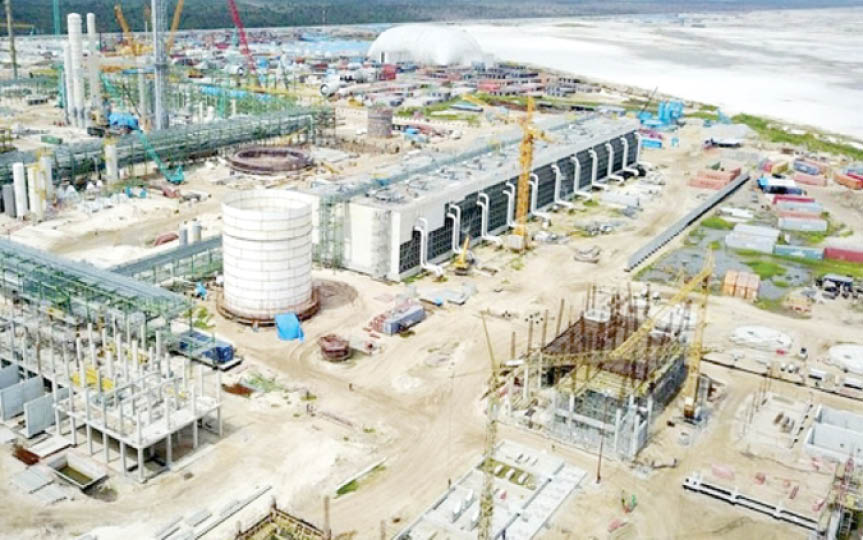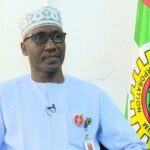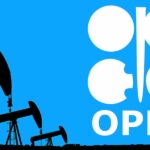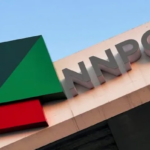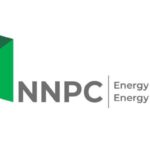The COVID-19 pandemic has affected the completion of the Dangote Refinery and also crippled a critical segment of the Ebute-Metta to Apapa segment of the Lagos to Ibadan rail project.
The two major projects are seen as key to advancing Nigeria’s crave for self-sufficiency, industrialization, massive export and ease of doing business.
- Dangote refinery commences operation next year
- Dangote Refinery to save Nigeria over $2.5bn yearly in remittances
Even though it is a private venture being spearheaded by Africa’s richest man, Alhaji Aliko Dangote, the Dangote Refinery is expected to find a lasting solution to Nigeria’s heavy dependence on importation of petroleum products for domestic consumption.
All Nigeria’s refineries are comatose and the country relies heavily on importation despite its strategic position as Africa’s largest oil producer, pumping about 1.78 million barrels per day in March.
Oil sales contribute about 90% of the country’s foreign exchange earnings, 60% of the revenue, and 8% of GDP, according to Nairametrics.
Experts believe that the world’s leading oil-producing countries appear to be the hardest hit by the COVID-19 because of the near collapse oil prices.
But the situation is worse for countries like Nigeria that have to deplete its foreign earnings to import refined petroleum products in order to oil local demands.
Those with the knowledge of the oil sector said the situation would have been different if the Dangote refinery had come on board before the coronavirus.
Projections on the Dangote Refinery

In July 2017, major structural construction began at the project site, and Dangote Group estimated that the refinery would be “mechanically complete” in late 2019 and commissioned in early 2020.
The refinery deadline was postponed to the end of 2019, after a change of location and Nigeria’s inefficient ports in Lagos where most of the equipment needed for the construction work would come through.
Estimated to cost about $18billion, the refinery will produce Euro-V quality gasoline and diesel, as well as jet fuel and polypropylene.
The Dangote Refinery, which was 75 percent near completion as of March, 2020, had its completion date moved to 4th quarter of 2020 because of coronavirus pandemic, Daily Trust learnt.
Upon completion, the Dangote Refinery, which is situated on 6,180 acres (2,500 hectares) of land at the Lekki Free Zone in Lagos is expected to be Africa’s biggest oil refinery and the world’s biggest single-train petroleum facility.
The refinery will be able to process 650,000 barrels of crude oil per day into refined petroleum products, which will help Nigeria become an oil refining country, not just an oil exporter.
Nigeria currently imports most of its refined petroleum due to lack of domestic refining capacity in the country.
However, experts say with the Dangote facility, Nigeria’s refining capacity will double and help in meeting the increasing demand for fuel while providing cost savings.
The Petroleum Products Pricing Regulatory Agency (PPPRA) recently stated that Nigeria imported 19.2 billion litres of petroleum products in 2019, while the country’s refineries produced only 166.33 million litres of Premium Motor Spirit (PMS) also known as petrol, in 2019.
Consequently, the Nigerian National Petroleum Corporation (NNPC) noted that the federal government paid N752bn as petrol subsidy in 2019, equivalent to 62 percent of the amount spent on capital expenditure in the year (N1.2trn).
We’re on track
Dangote Group Executive Director, Devakumar Edwin has confirmed that the oil and gas refinery remains on track and would be operational in early 2021 despite the disruption caused by the COVID-19 pandemic.
Speaking to ‘the African report,’ he said: “The impact of the delay will be ‘45 days max’ as complete closure, which would have meant a delay of up to 90 days was avoided.
“There have been some reductions in staffing because of the need for social distancing, but work has been continuing. Almost everything needed to complete the project has already been procured,” he said.
According to him, “My focus is to sell it in any part of the world. I am ready for all the markets. The volume is so large obviously I can meet the requirements of all the products of Nigeria and I will still have surplus to export.”
Efforts to get more information on how the project was being handled despite challenges were not successful but credible sources said refining would start in earnest.
Located at Lekki Free Trade Zone along the coast of the Atlantic Ocean, The Dangote Refinery will allow for smooth transshipment of refined petroleum products to international markets, and ultimately eliminate the overreliance of fuel import from other regions into Nigeria.
During different phases of the project, a total of 4,000 direct and 145,000 indirect jobs will be generated, according to the Dangote Group.
International and local contractors like MAN Diesel & Turbo, Schneider Electric, C&I Leasing, Honeywell UOP, and Air Liquide Engineering & Construction have benefitted from the building of the refinery.
No alternative to Dangote Refinery
Speaking on the delay in completion, Sam Chidoka who is the Managing Director and Chief executive officer of Kairos Capital, a company that specialises in customised financial solutions to individuals and corporates based on our understanding of their strategic intentions and needs, said: “the delay is not unexpected when you consider the massive size of that project and all the logistics involved.
“The cost of the delay is certainly humongous both on the part of the owners of the project and also to Nigeria, which has come under the heavy burden of complete reliance on fuel importation,” he said.
As a way forward, he said Nigeria would have to moderate its expectations in the face of the current reality especially as there were no other options.
He also called on the federal government to begin to consider models for building modular refineries that would enable the country to increase refining capacity.
Also speaking on the 4 refineries owned by the government, Chidoka said they should all be sold.
According to the finance expert, “we should learn from the power of privatization where we sold the power assets for so much money and it left the buyers with very little to improve and upgrade what they acquired, I recommend they (refineries) be sold for $1 to those who can show capacity to revive and upgrade them.
Setback for rail track

Similarly, checks by the Daily Trust showed that whilst the rail track laying from Ebute-Metta junction to Ibadan was completed in March, 2020, the extension from Ebute-Metta to Apapa ports is far from completion.
The Ebute-Metta to Apapa ports segment is seen as one of the critical segments of the rail facility because it is capable of unlocking the intractable traffic situation at the Apapa Ports that is rubbing the country off billions of naira in revenues annually due to the downtime at the ports and road.
The 157km Lagos-Ibadan rail project worth $ 1.53bn commenced in March 2017. It was billed to have been finished by May 2020 but that didn’t happen.
However, when fully operational, the facility is expected to have 10 stations and trains operating at a maximum speed of 150 km/h. The project is the second segment of the new 2,733km Lagos-Kano Standard Gauge Railway line project.
The contractor, China Civil Engineering and Construction Company (CCECC) had tweeted that “The track laying work on the main line for the Lagos-Ibadan railway has been completed at 12:08 pm, on March 28. This marks the fact the railway is getting one step closer to opening to traffic.
“But with the lockdown after March 28, not much has been done. The part remaining is from Ebute- Metta to Apapa, which is additional work to the project as a result of the government’s determination to decongest the port by linking it to the railway network. Timeline of completion would only be determined after the nation opens up and construction commences,” it stated.
It noted that “the lockdown obviously is a challenge not just for CCECC but most companies as a result of the partial shutdown of global shipping lines and disruption of supplies.”
The Managing Director/CEO, Nigerian Railways Corporation (NRC) also confirmed the stalling of the work.
He, however, said during the lockdown, the NRC took delivery of rolling stock to be used on the rail line and perhaps Abuja.
“We have now reached Ebute -Metta junction with one track. Also some facilities and locomotives have arrived. We have 44 coaches, six locomotives and two sets of diesel multiple units making additional 15 coaches and four locomotives. We received them during the lockdown. Before the lockdown they had gotten to Ebute- Metta junction to Ibadan,” he explained.
But the $6.68 billion Ibadan-Kaduna rail contract financing deal that was at the verge of being struck with the Chinese government has suffered a significant setback as discussions on it have been suspended due to the pandemic, our correspondent gathered.
Recall the Minister of Transportation, Mr. Rotimi Amaechi, had in January, 2020, said Nigeria hasn’t yet received the loan requested from China for the Ibadan-Kaduna rail project but that a meeting was scheduled in China to further discuss the loan terms. The federal government made a request of about $6.7bn to the China EXIM Bank to fund the project. The meeting was later cancelled when the COVID-19 broke out.
The government had previously signed a $6.68 billion contract agreement for the Ibadan-Kaduna segment of the Lagos-Kano rail line with China Civil Engineering Construction Corporation (CCECC). Nigeria is to provide 15 percent counterpart funding for the project. The minister had said the Nigerian government is ready, with its counterpart fund but the delay on the project was the loan request from China.
An attempt to get further updates from the minister didn’t yield results as he didn’t return SMS sent to his phone and WhatsApp on the matter.
It’s worst period in history
Vice President Yemi Osinbajo said yesterday that with the COVID-19 pandemic, Nigerian economy is facing its worst period in history.
According to him, the nation is earning 40 percent less than it should because oil prices have fallen and few today can afford to pay taxes.
He said this in a message sent to the 11th Synod of the Church of Nigeria (Anglican Communion), Abuja Diocese, themed ‘Building a Sure Foundation: The Synod had started on Saturday, July 25 at St James’ Church, Asokoro, Abuja.’
According to him, “There was a day in April when oil, our precious oil was selling for less than the cost of production. No one was even willing to buy. Suddenly all we took for granted, from air travel to hugs and even handshakes have become neither safe nor advisable.
“The sum and substance of what I am saying is that these past few months have shown us that human ingenuity and planning cannot even assure us that we will live to see the next day. Any hopes built on the foundation of human understanding and effort is a shaky and unsure foundation and is bound to fail when the storms and the turbulence come.”
Osinbajo, however, expressed optimism that Nigerians and all people around the world will survive the despair, pain and other consequences associated with the pandemic.
“Everything around us has been shaken and is being shaken by the greatest global threat to mankind in a century. We’re in the midst of the greatest economic slump in history; every region of the world is experiencing an unprecedented slowdown in growth. It’s my firm belief that by the grace of God, very soon, this pandemic will be defeated,” he said.
